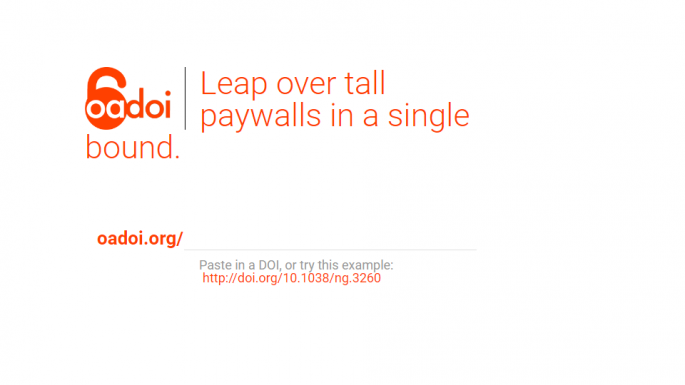Use oaDOI link and find an open version of the article!
26/10/2016


This week is International Open Access (OA) Week and those who are interested in spreading the word about OA are celebrating with a series of events, launching new OA products, sharing announcements and blog posts. On the occasion of the OA week, a new online product - oaDOI link helping you to search for open articles was launched!
____________________________________________________________________________________________
The oaDOI system was inspired by Digital Open Access Identifier (DOAI) - run by Committee for the Accessibility of Publications in Sciences and Humanities (CAPSH). DOAI improves on coverage, and offers an API with license information and other details. It's in active development by the Impactstory team.
An oaDOI link is like an alternate Digital Object Identifier (DOI) resolver, with a useful difference: if there's an OA version of the article, the oaDOI URL will send you there (i.e. you will get an article right in PDF, e.g., oadoi.org/10.1038/ng.3260), instead of the paywalled article landing page (e.g., doi.org/10.1038/ng.3260).
An oaDOI link is searching for open copies of articles using the following data sources:
- The Directory of Open Access Journals;
- CrossRef’s (license: metadata field);
- DOI prefixes (if it's in a known preprint repository);
- DataCite (if it’s an open dataset;
- BASE OA search engine (if there’s a Green OA copy of the article);
- Journal article pages directly (if there’s a free PDF link.
oaDOI is being built at Impactstory, funded by the Alfred P. Sloan foundation.
____________________________________________________________________________________________
Similar projects:
[The Open Access Button is developing a brand new tool to include Open Data] AIMS blog
Did you know that?..
While many librarians are vocal advocates of OA, just as with scholars in other fields, academic librarian professional advancement remains tied to publication in particular journals. The results of this small benchmarking study show how many articles were published OA, how many were self-archived by LIS authors, and how many articles were inaccessible to non-subscribers. Less than 10% of library literature is available OA…
Over the next six months, the Green Open Access Working Group (GOAWG) will contact authors of recently published LIS literature to encourage them to self-archive as a way to maximize access to their work.
If you would like to volunteer for this project to help open up LIS literature, you can sign up on the form linked to GOAWG page.
